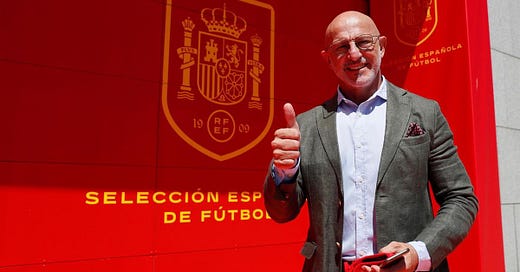Who is Luis de la Fuente?
You would be forgiven for seeing the news that Luis de la Fuente had been appointed the new Spain coach and thinking, “who?”.
For part-time aficionados of Spanish football, he’s far from a household name. For the dedicated superfans, he’s the Athletic Club left-back turned Spanish youth football expert.
De la Fuente steps up from Spain’s under 21 set-up, where he has been in charge for four years, and will now lead the senior team in a permanent capacity as RFEF president Luis Rubiales pushes to maintain the same stylistic approach.
In recent times, he has operated with a 4-3-3 system akin to that which Luis Enrique has used. He has even replicated the false nine at times, with players like Mikel Oyarzabal, though he has more routinely called upon a more traditional target man in the role. The likes of Rafa Mir and Abel Ruiz have filled out that role well for him.
He prefers a possession-based game, though he does tend to go with more aggressive wingers who play in wider positions to provide a plan B which can go more direct if required. His three-man midfield, which has evolved from the 4-2-3-1 he used with the under 19s, dictates the tempo. That role has fallen on the shoulders of Martín Zubimendi in recent years.
He’ll be joined by a team of his colleagues, rather than turning to experience. His assistant will be Pablo Amo, until now the coach for Spain’s under 18 side. He’ll be replaced by another ex-Athletic Club player, Julen Guerrero, who takes over as coach of the under 21s.
That is despite not having a great deal of experience himself. At club level, his highest level was in Segunda División B, where he lasted just four months with Alavés, nine months with Aurrerá de Vitoria, and had two longer stints with Bilbao Athletic, the Basque club’s B team, in the noughties.
In 2013, he joined the RFEF and the Spanish national team set-up to work with the under 19s as their manager while Vicente del Bosque remained in charge of the senior side. His first match in charge came at the European Championships, with a 1-0 win over Portugal, and saw the likes of Héctor Bellerín, José Luis Gayà and Adama Traoré feature. The campaign ended with a 2-1 defeat to a French side including Anthony Martial.
Two years later, he was more successful. Spain won the European Championships at under 19 level in 2015 for the first time, with several of today’s squad featuring, including Marco Asensio and Rodri, while Unai Simón was second choice between the sticks and other familiar names like Mikel Merino, Dani Ceballos and Borja Mayoral featured prominently.
In 2018, he stepped up to take over the under 21s side after Albert Celades left to join Julen Lopetegui at Real Madrid. That loyalty would be remembered later. He oversaw 42 games in total, losing only four, and would repeat the feat of winning the European Championships for the age group in 2019.
Many of the players he had won with in 2015 had progressed on, and he also incorporated the likes of Carlos Soler, Mikel Oyarzabal, Dani Olmo and Fabián Ruiz. They would again feature as he took charge of the Spanish side to win silver at the Olympic Games in Tokyo in 2021, where Real Sociedad midfielder Merino donned the captain’s armband. His biggest, and bravest, call that time was to ignore the pleas of Sergio Ramos and Gerard Piqué to form part of the squad.
He also has experience in the hot seat of the Spain senior team. He was the man who stood in for Luis Enrique amid a Covid-19 outbreak as Spain beat Lithuania 4-0 in Leganés with a side effectively brought across from the under 21s. "I'm really happy. I've fulfilled a dream, just like the players," the coach said after the game. "I enjoyed it. I feel proud to have coached the senior team once... I want to thank the federation for the opportunity and I hope I can repeat it in the future!" Little did he know what was to come.
To call him a RFEF yes man might be overly simplistic, but it would not be far from the truth. He is the polar opposite of Luis Enrique in terms of character, and a man who rarely goes against the grain and avoids controversy. You most certainly won’t find him on Twitch any time soon.
That’s not to say that he shies away from the big issues. "I want to send my support to my colleague Jorge Vilda and all my encouragement,” he said when the women’s team coach was under severe pressure as half of his squad refused to play for him. While Luis Enrique remained silent on the topic, De la Fuente followed the RFEF’s line.
De la Fuente enjoys a strong relationship with many of the country’s leading media outlets and has already received positive reaction from many major players. In a piece titled “Luis de la Fuente, el nuevo Capitán España”, AS’ Ignacio Camacho writes: “His track record backs him up, but more so does his way of being. ‘He's a really nice guy, a legend’, are the most repeated words among journalists who have covered the national youth teams in recent years.”
Seen as the continuity of the philosophy and style of the Spanish national team, his personality will make the life of Luis Rubiales a lot easier. He’s an unglamorous appointment, uninspiring some may say, but he’s one who ensures that the pressure will ease on the RFEF in the short-term. Whether it pays off in the medium to long-term remains to be seen on what he can achieve on the pitch.





